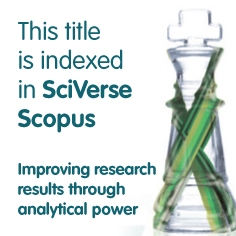Review Process
Criteria for Review of IJCC Articles
Research articles are first screened by the Editor-in-Chief to verify that they demonstrate a scholarship of teaching and learning before being sent for blind review by two or more members of the Editorial Advisory Board who will evaluate each manuscript based on the following criteria.
1. Clear goals
Does the scholar state the basic purposes of his or her work clearly?
Does the scholar define objectives that are realistic and achievable?
Does the scholar identify important questions in the field?
2. Adequate preparation
Does the scholar show an understanding of existing scholarship in the field?
Does the scholar bring the necessary skills to his or her work?
Does the scholar bring together the resources necessary to move the project forward?
3. Appropriate methods
Does the scholar use methods appropriate to the goals?
Does the scholar apply effectively the methods selected?
Does the scholar modify procedures in response to changing circumstances?
4. Significant results
Does the scholar achieve the goals?
Does the scholar's work add consequentially to the field?
Does the scholar's work open additional areas for further exploration?
5. Effective presentation
Does the scholar use a suitable style and effective organization to present his or her work?
Does the scholar use appropriate forums for communicating work to its intended audiences?
Does the scholar present his or her message with clarity and integrity?
6. Reflective critique
Does the scholar critically evaluate his or her own work?
Does the scholar bring an appropriate breadth of evidence to his or her critique?
Does the scholar use evaluation to improve the quality of future work?
Statement of Publication Ethics and Publication Malpractice
The International Journal of Cyber Criminology is committed to the academic community and the lay world in ensuring ethics in publication and quality of articles in publication. Plagiarism is strictly condemned and papers found to be plagiarized will be removed or not published in the International Journal of Cyber Criminology. While signing the publication agreement the author(s) have to warrant that the article and associated materials are original and it does not infringe the copyright of anyone. Also the authors have to warrant that there was a full consensus of all the authors and it was neither submitted nor published previously.
Process for IJCC Articles
The review process for research articles follows this procedure:
1. Editor-in-Chief screens research article submission to be sure it meets the basic criteria for scholarship by being based upon research questions, methods, evidence, assessment, and conclusions. If the Editor-in-Chief is convinced that the article may not fit the journal's objectives it will be desk rejected.
2. If it is suitable, than, the Editor-in-Chief sends the article to the Managing Editor. Managing Editor takes care of the review process and sends to Editorial Advisory board members/reviewres.
3. Editorial Advisory Board members read the manuscript and indicate their assessment of the article on the electronic review form, based upon the Scholarship Assessed criteria given above and upon the following Cyber Criminology rubric:
Relevance for IJCC
Does the paper focus sufficiently on a Cyber Criminology question or inquiry?
Does the paper have a purpose and provide knowledge applicable to the Cyber Criminology Field?
Does the paper give evidence of significant and ethical Cyber Criminological research?
Content
Are the paper's conclusions valid based upon the evidence systematically gathered and upon the argumentation provided?
Does the paper provide new knowledge or otherwise advance the field of Cyber Criminology?
Does the paper have originality of approach or questions pursued, or a unique perspective on familiar approaches or questions?
International Significance & Relevance
Is the paper on a topic that would be of value for an international readership?
Is the paper intellectually accessible for University/college faculty in various countries and Practitioners of Criminal Justice System?
Does the paper serve to promote international knowledge, conversations or collaborations about the topic, or about Cyber Criminology in general?
Each reviewer will include on the review form specific and narrative comments for the author of the submission about its content, argumentation, research methodologies, data, conclusions, etc. These comments will be given to the author, without identifying the reviewers for the purpose of the giving the author feedback on the article, whether the article is being considered for publication or not.
Each Reviewer will give a recommendation about publication of a manuscript according to the following list of options: * Accept: no revision needed * Accept: minor revisions needed * Major revision needed: suggest revision & resubmission * Reject (provide reasons in comments) * Submission topic or methodology not appropriate for IJCC
When all reviews have been received by the managing editor, a decision will be made regarding publication and authors will be contacted by the managing editor/editor-in-chief. If the reviews are very different, the editor may ask 1-2 additional Editorial Advisory Board members to read and evaluate the submission and then, upon receipt of the additional reviews, a final publication decision will be made by the Editor-in-Chief.
The response time for review of articles will normally be 3 – 6 months

